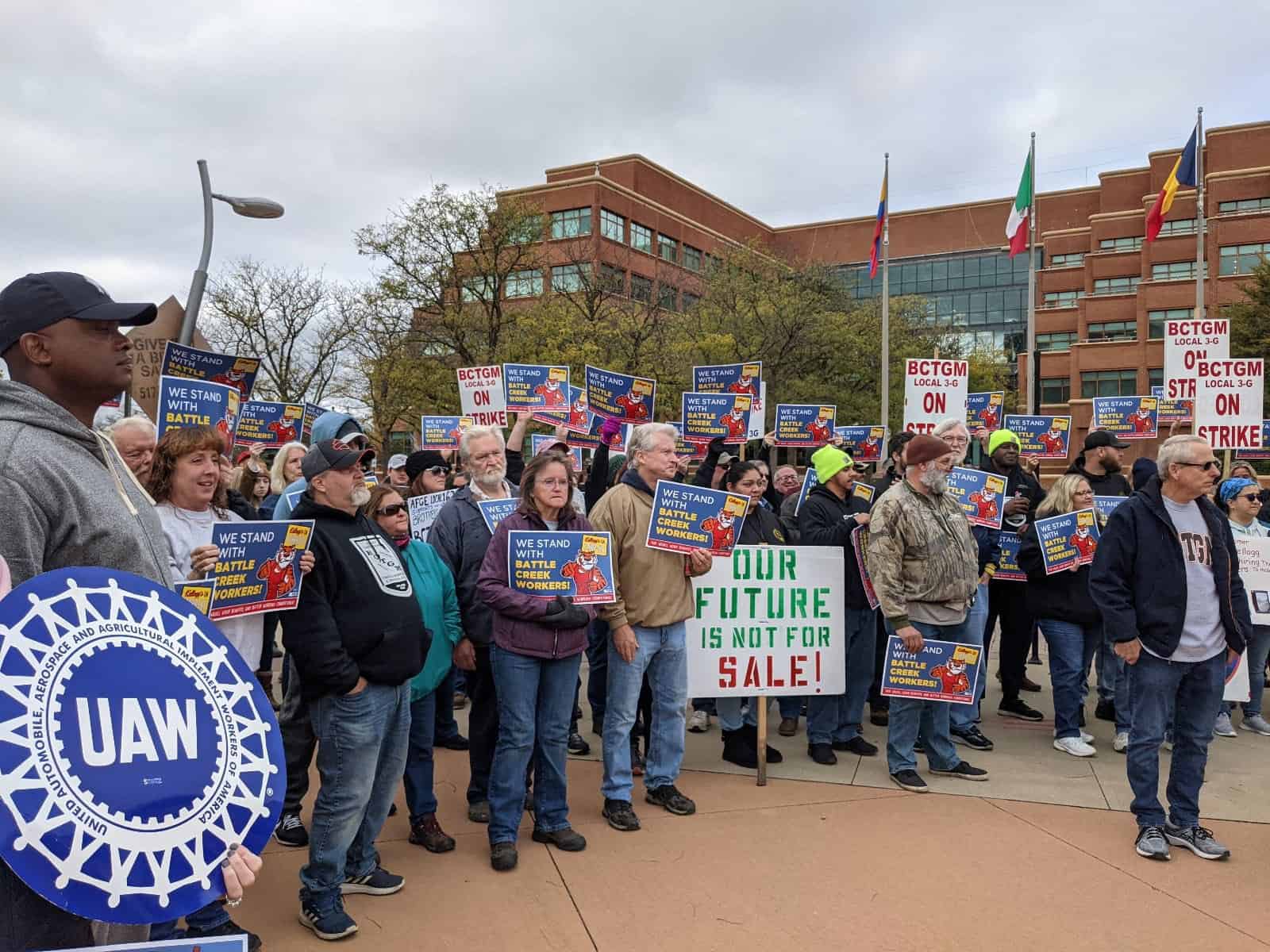
Fred Wang is a student at Harvard Law School.
On the eve of the Thanksgiving holiday, workers across the country and around the world are taking to the picket line to voice grievances over wages, health insurance, and working conditions. Yesterday, in San Francisco, a local union announced that hundreds of airport workers intend to protest inadequate health-care benefits on the Wednesday before Thanksgiving, one of the busiest travel days of the year. In Houston, employees for the grocery giant Kroger are expected to strike within the week. Staff at the product-review website Wirecutter will be striking from Thanksgiving through Cyber Monday. Cereal-plant workers for Kellogg’s, who have been on strike since October 5, will continue picketing through the Thanksgiving weekend as negotiations have stalled—prompting the food manufacturer to hire permanent replacements. And outside the United States (as Fran noted earlier in the week), Amazon employees in 20 countries are preparing to strike or protest on Black Friday, as part of an international “Make Amazon Pay” campaign.
On Tuesday morning, the Biden administration petitioned a federal circuit court of appeals to lift the court order currently blocking the “shot or test” emergency regulation. The regulation requires that large employers either implement a mandatory vaccination policy or impose regular COVID-19 testing. In its motion to dissolve the stay, the federal government argued that the regulation’s challengers were unlikely to succeed on the merits, that they did not face any irreparable harm, and that the balance of equities and public interest did not tilt in their favor. Moreover, in the event that the court refuses to dissolve the order entirely, the federal government urged that the stay be at least modified such that the regulation’s masking-and-testing requirement could still remain in effect.
As part of its motion, the federal government requested an extension of the motion’s word limit from the 5,200-word default to 13,000 words. One commentator observed that the effort to file an overlong brief reflects the administration’s awareness that “the stay is going to effectively be the ballgame given the short time the ETS is in effect.” The petition comes nearly two weeks after the federal appellate court that initially issued the order doubled down on and extended the stay.
On Monday, the U.S. Department of Labor published a final rule raising the minimum wage for federal contractor employees to $15 an hour. The new wage floor displaces the $10.95 minimum wage for contractors and will apply to new or updated contracts starting January 30, 2022. The regulation finalizes an executive order signed by President Biden in April this year. Labor Secretary Marty Walsh stated that the rule would improve the “economic security” of laborers who “do essential work on our nation’s behalf” and their families.
Earlier this week, Bloomberg reported that India’s Prime Minister Narendra Modi planned to defer implementation of controversial deregulatory labor reforms until after local elections next year. As a policy matter, the reforms would make it easier for employers to fire workers, while making it much more difficult for trade unions to be registered and to call strikes. The decision therefore likely reflects the political judgment that pre-election implementation would be electorally costly for Modi’s Bharatiya Janata Party. The Modi government had already postponed implementation of these labor codes several times. The policy reversal comes less than a week after Prime Minister Modi announced that his government would repeal three agriculture laws that had been the target of sustained, widespread farmer protests.
Last Friday, National Labor Relations Board (NLRB) prosecutors issued a formal complaint accusing subsidiaries of the Kroger Company of violating federal labor law by prohibiting their employees from wearing Black Lives Matter (BLM) apparel and buttons. Per the NLRB complaint, such employees were engaging in “concerted activities” with other employees “for the purpose of mutual aid and protection,” and that such messaging was used to protest racism in their workplaces. Noncompliant employees were sent home from their shifts prematurely and without pay. The complaint comes on the heels of the NLRB’s General Counsel’s announcement last month that employees participating in BLM protests are protected by federal labor law. The NLRB is already litigating a similar issue involving Home Depot’s policy barring workers from displaying political messages on their work aprons.






Daily News & Commentary
Start your day with our roundup of the latest labor developments. See all
July 2
Block, Nanda, and Nayak argue that the NLRA is under attack, harming democracy; the EEOC files a motion to dismiss a lawsuit brought by former EEOC Commissioner Jocelyn Samuels; and SEIU Local 1000 strikes an agreement with the State of California to delay the state's return-to-office executive order for state workers.
July 1
In today’s news and commentary, the Department of Labor proposes to roll back minimum wage and overtime protections for home care workers, a federal judge dismissed a lawsuit by public defenders over a union’s Gaza statements, and Philadelphia’s largest municipal union is on strike for first time in nearly 40 years. On Monday, the U.S. […]
June 30
Antidiscrimination scholars question McDonnell Douglas, George Washington University Hospital bargained in bad faith, and NY regulators defend LPA dispensary law.
June 29
In today’s news and commentary, Trump v. CASA restricts nationwide injunctions, a preliminary injunction continues to stop DOL from shutting down Job Corps, and the minimum wage is set to rise in multiple cities and states. On Friday, the Supreme Court held in Trump v. CASA that universal injunctions “likely exceed the equitable authority that […]
June 27
Labor's role in Zohran Mamdani's victory; DHS funding amendment aims to expand guest worker programs; COSELL submission deadline rapidly approaching
June 26
A district judge issues a preliminary injunction blocking agencies from implementing Trump’s executive order eliminating collective bargaining for federal workers; workers organize for the reinstatement of two doctors who were put on administrative leave after union activity; and Lamont vetoes unemployment benefits for striking workers.